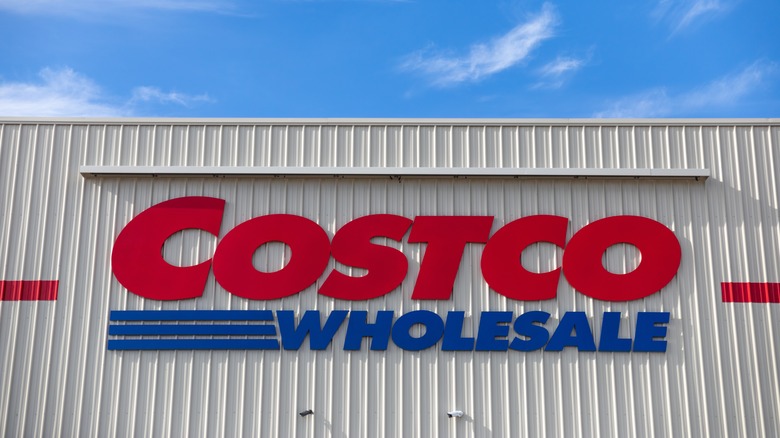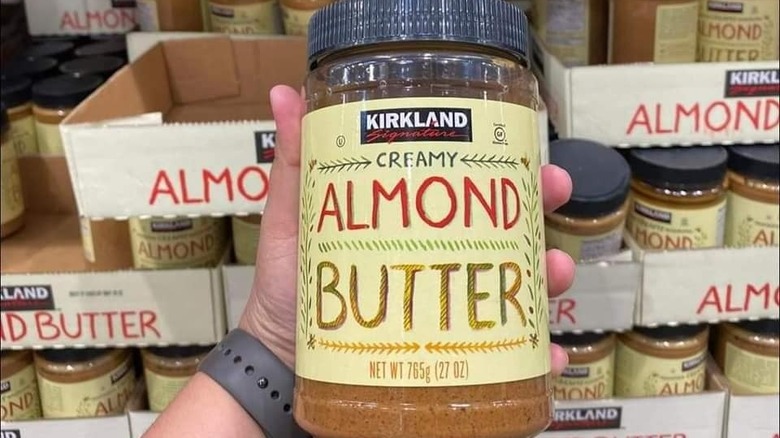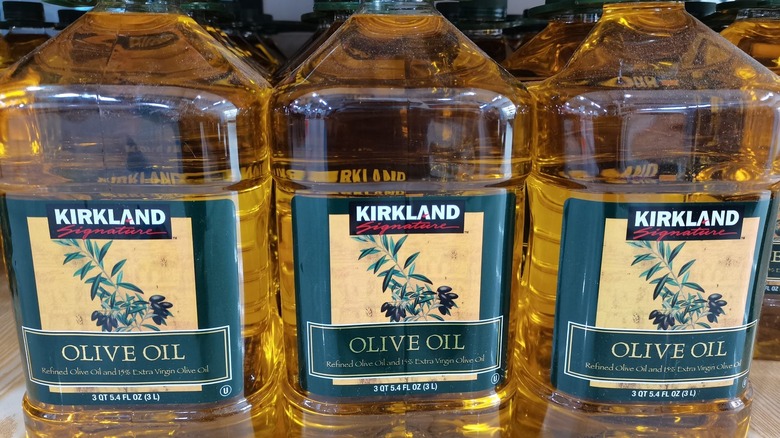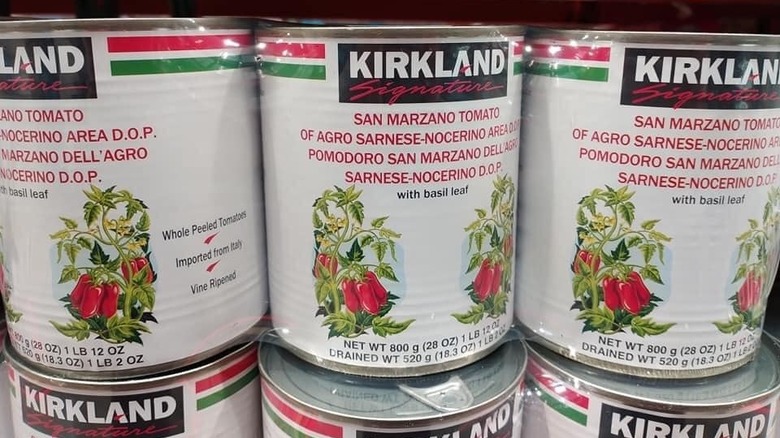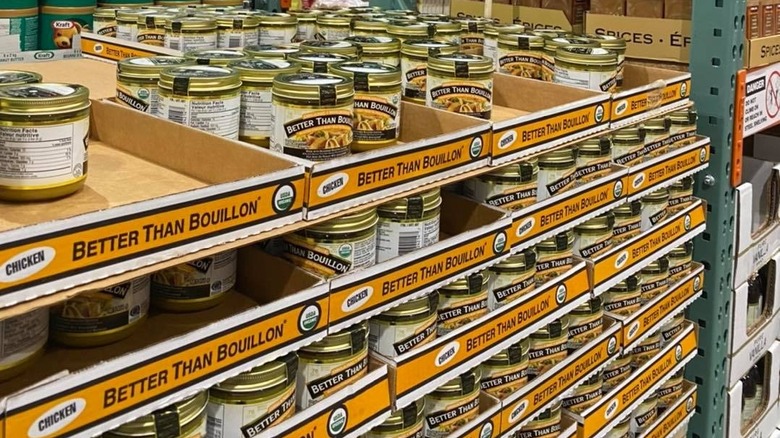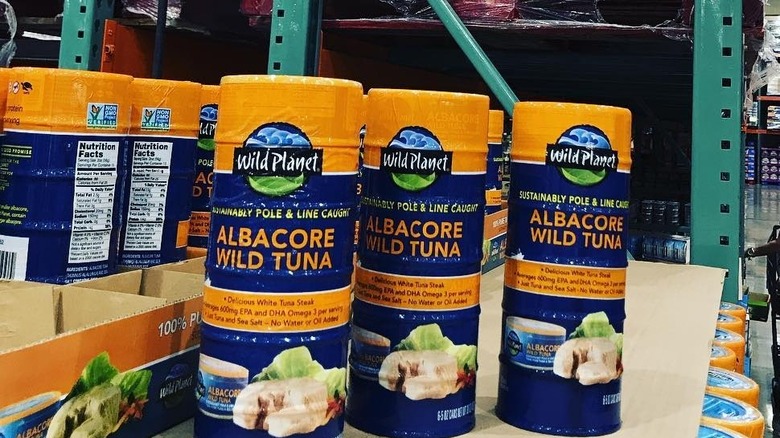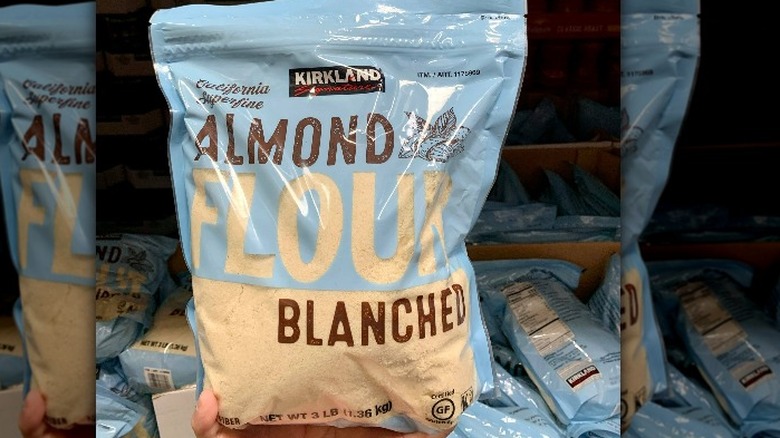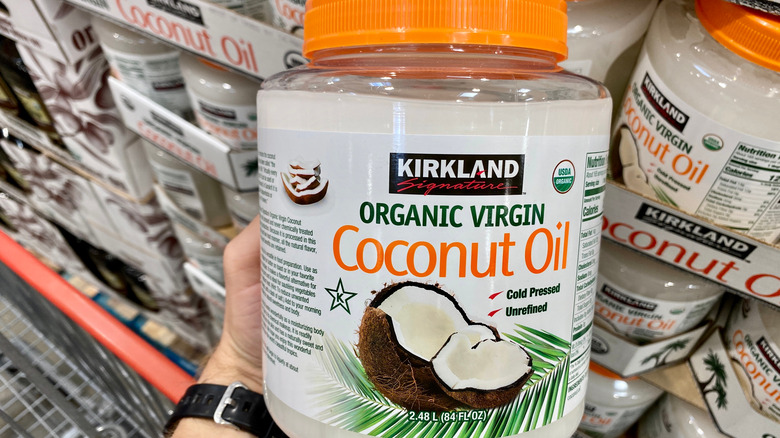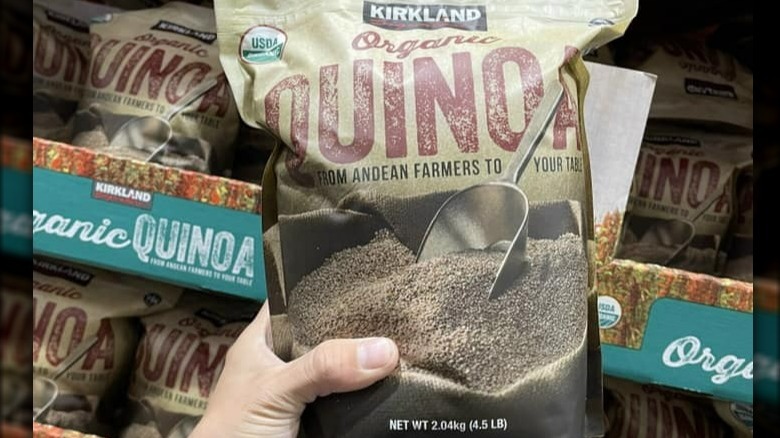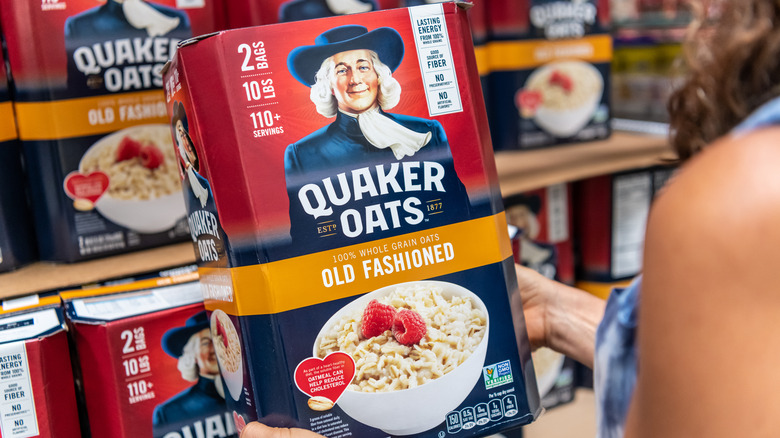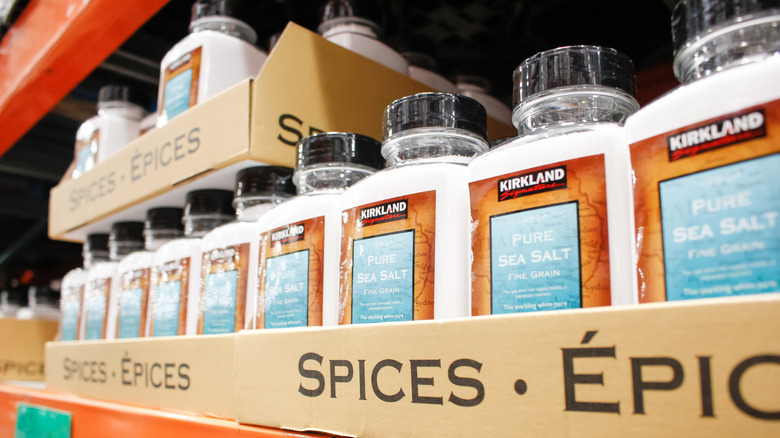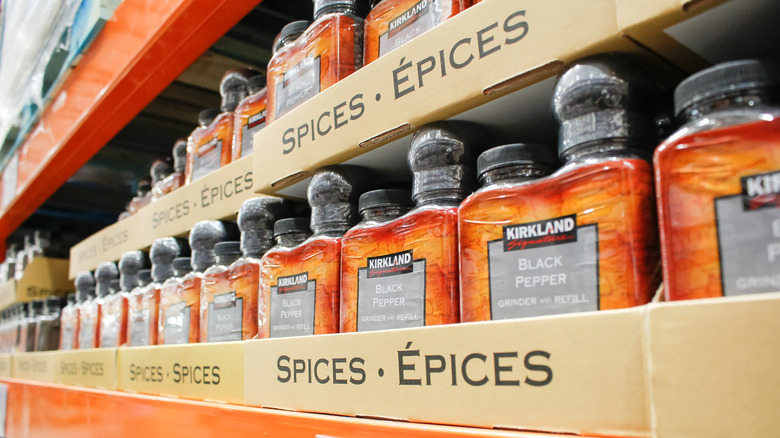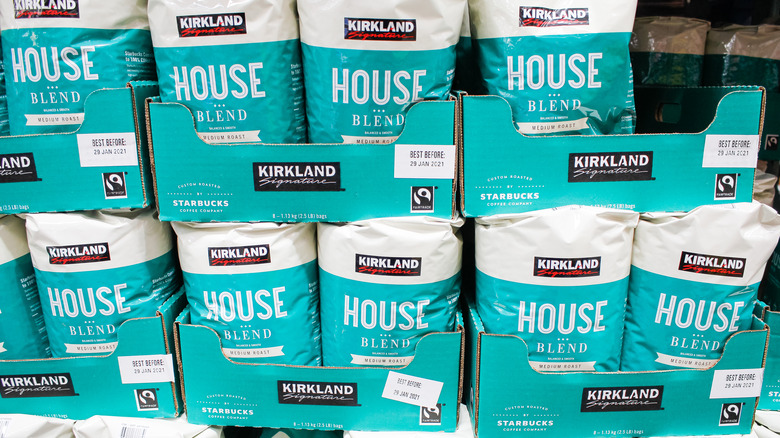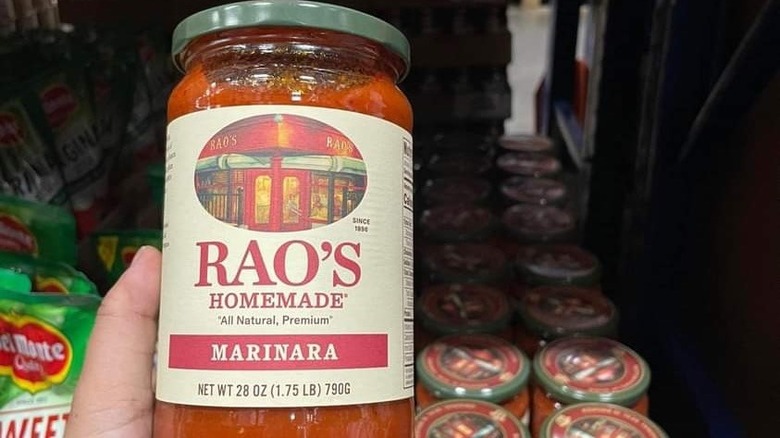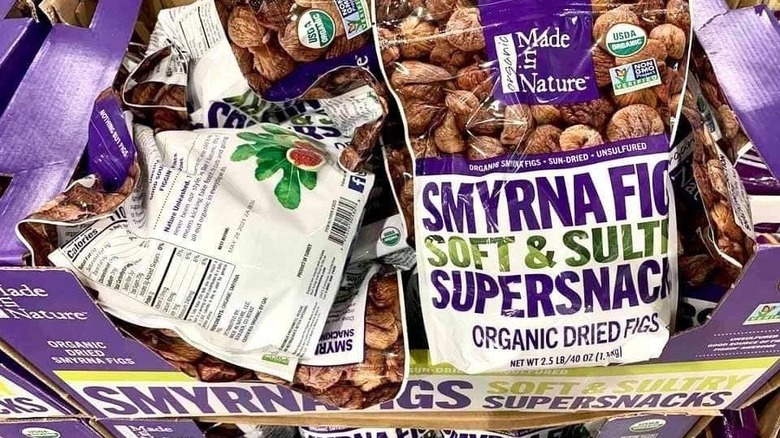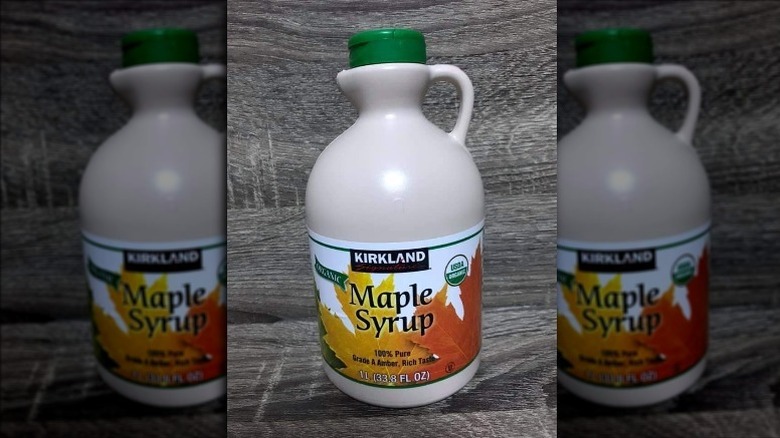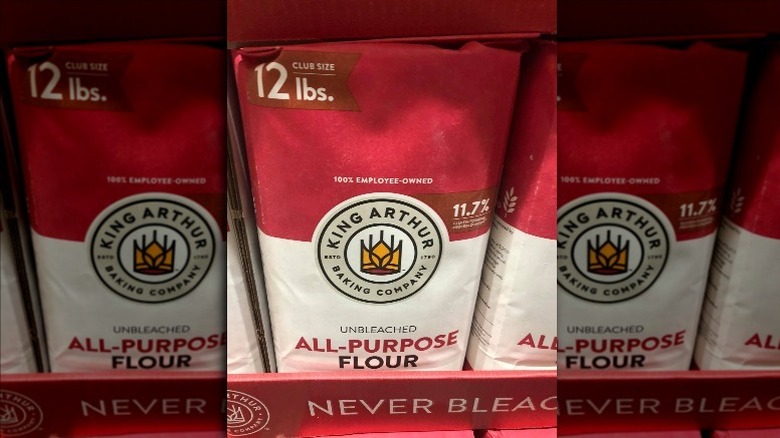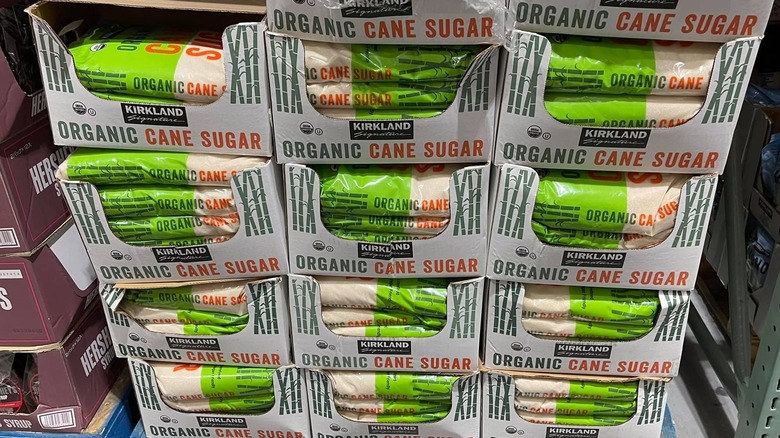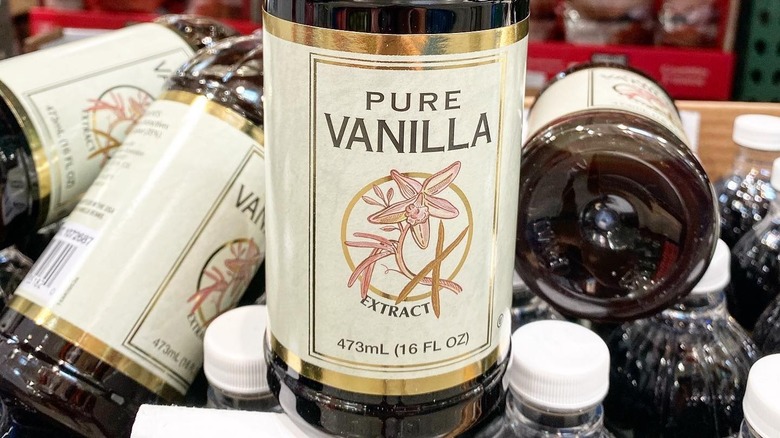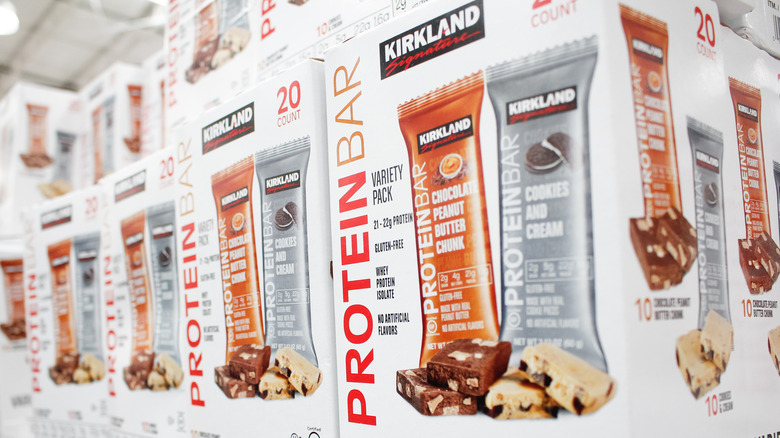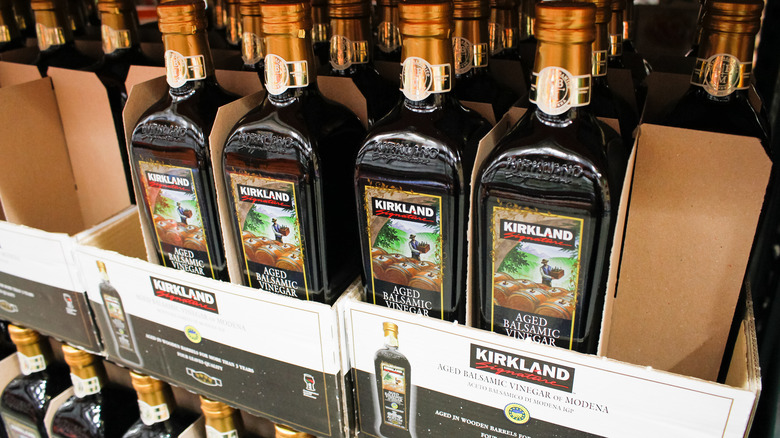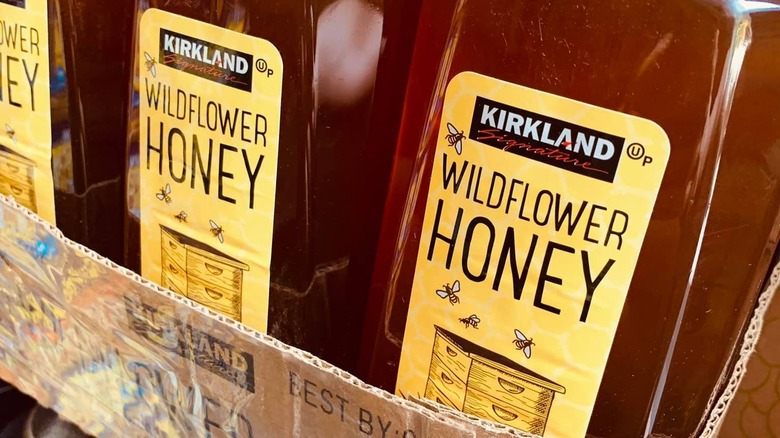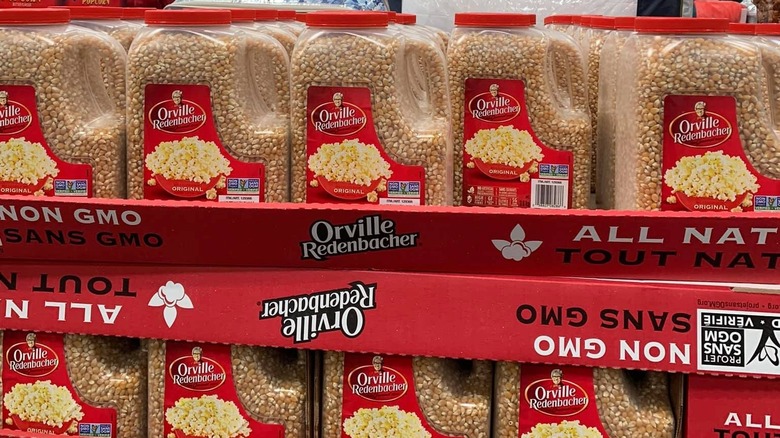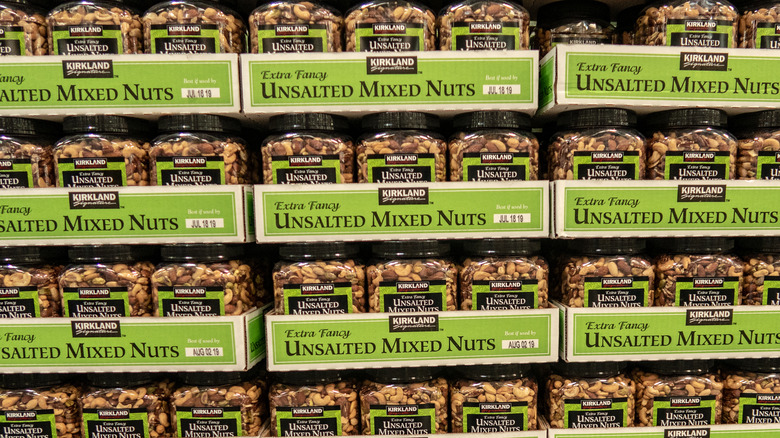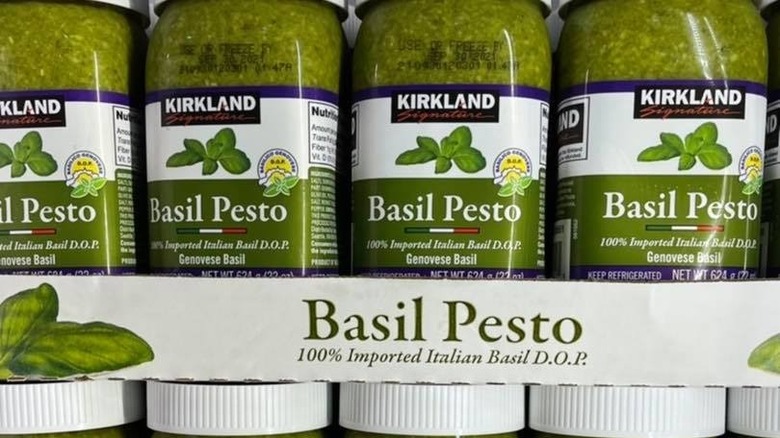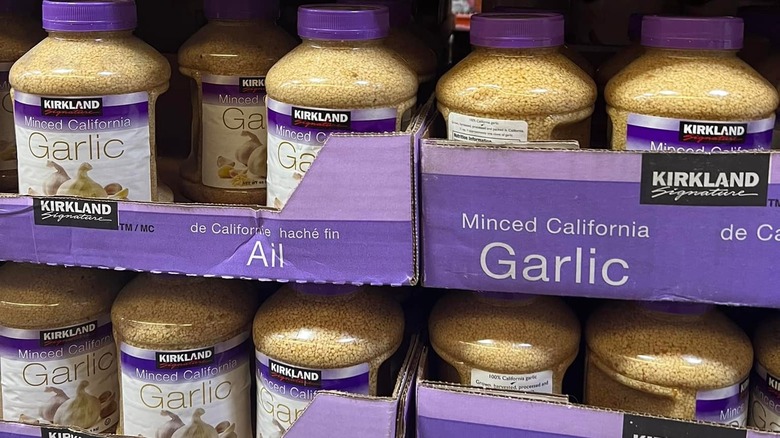Pantry Staples You Should Be Buying From Costco
Fans of membership-only megastore Costco have many reasons for loving the wholesale warehouse retailer, from the amazing deals on everything from TVs to gasoline, to army-size supplies of paper towels and those famous rotisserie chickens (not to mention the Costco food court hot dog combo).
While it's certainly far more than a mere grocery store, food items are likely to be the bulk of what's on a normal Costco shopping list. You can score everything from fresh produce to fantastic bottles of booze with a lot more in between. Everyone has their must-buy Costco freezer staples and their always-avoid Costco items that aren't worth it, but as with most things, the best bets largely depend on your personal preferences and circumstances. One thing that's for certain: When it comes to Costco food, shelf-stable choices abound — from oversize boxes of cereal to multipacks of mac and cheese, it's a veritable paradise of pantry items. So we've rounded up some of the best pantry staples to buy at Costco to keep your shelves stocked for affordable, easy meals at any time.
And, in one of the best Costco hacks around, you can buy many of these items through Instacart and other grocery delivery services even if you're not a Costco member. Here are the pantry staples you should be buying from Costco from now on.
Nut butter
Schmeared on your toasted carb of choice, blitzed into smoothies, or spackled on apple slices, nut butter is a breakfast linchpin, but it also shines in savory sauces and desserts. The giant jars of peanut butter and almond butter at Costco will last you a long time, even if you use them in every meal. You can find various brands of nut butter there, but the Kirkland Signature peanut butter is a fan favorite, as is the Kirkland almond butter.
In fact, Costco almond butter is a particular treasure even among keto eaters and Whole30 participants, thanks to its simple ingredients list — just roasted almonds. It contains no added oils, salt, or preservatives of any kind, making it a healthy option that's also delicious. It has a nutty depth of flavor from the almonds having been roasted and a natural sweetness with no added sugar. It's also made in a peanut-free facility.
You can store it in the fridge once opened to make it last longer, but if you tend to go through a jar fairly quickly, just keep it in a cupboard away from heat and light (which will also keep the texture a bit looser and easier to spread).
Olive oil
Even chefs stan Kirkland olive oil, which is pressed and bottled in Italy, though the olives themselves may also come from Portugal and Spain. Naturally, it comes in a huge bottle, but if you cook with olive oil for most meals, it should get used up before it goes bad. You can store it in the fridge or freezer to prolong its lifespan, but for convenience, you might want to decant a portion into a smaller bottle to keep closer to the stove (well away from the heat, though).
Note that you'll find more than one kind of Costco olive oil. It's the Kirkland Signature Organic Extra Virgin Olive Oil that Samin Nosrat says is "really good," but the 100% Italian olive oil also has its devotees.
Other shoppers like to pick up avocado oil to cook with, but the real key is to only buy a type of oil that you use frequently. You don't want to invest in a half-gallon of vegetable oil that will end up going rancid before you're halfway through and end up throwing that money away.
Canned San Marzano tomatoes
In general, canned tomatoes are a must-stock pantry staple, and many chefs and cookbook authors — including Ina Garten — recommend San Marzano tomatoes above all others. These Italian plum tomatoes have a rich, sweet flavor, and the Cento brand has been spotted at Costco. You may also find Kirkland Signature San Marzano Tomatoes, which are grown and canned in Italy, so you know you're getting the real thing.
Celebrity endorsements aside, cans labeled as San Marzano tomatoes aren't always worth it (or at least not always necessary for a delicious finished dish), but you'll definitely want to pick up some kind of canned tomato at Costco. Their Kirkland diced tomatoes have plenty of dedicated fans and are ready to go right in your chili, but whole tomatoes tend to be of better quality overall. They're also more versatile: You can dice or crush them if you need to, leave them whole, or puree for sauce.
Whatever kind you buy, if the can is bigger than you need for one recipe, you can store leftovers in an airtight container in the fridge for about a week or freeze for up to a month.
Better Than Bouillon
Broth and stock (whether chicken, vegetable, or beef) are always good to have on hand, but as evidenced in this Reddit thread, Costco shoppers seem to prefer stocking up on Better Than Bouillon. It's a concentrated paste made from roasted beef, chicken, or vegetables that one poster said "tastes so much richer than broth" or bouillon cubes and another called "a game-changer." Not surprisingly, one commenter testified that at Costco, it's "much cheaper than at other stores," and another pointed out the added benefit of "no more waste."
You can dilute a teaspoon of the paste in water to make your own broth, or just add small dabs straight to stir frys, sauces, and anything that could use a boost of umami flavor. Once opened, you do need to store it in the fridge, but the glass jar takes up far less room than a box of broth and will last a much longer time too — we're talking months.
Canned tuna
Another solid pantry staple, protein-packed canned tuna can be turned into a quick lunch or gussied up for dinner (whether a classic tuna casserole or a sprightlier, spicy tuna pasta). You've probably heard that oil-packed tuna is tastier, but a good brand of water-packed albacore is nothing to sniff at.
While Kirkland tuna gets rave reviews from many shoppers, Greenpeace raises some concerns about it. They do note that the company "made a great move by introducing more sustainable Kirkland Signature canned tuna" and ceased using Chicken of the Sea as a supplier a few years back, but they still call for more transparency when it comes to Costco's current policies and sources (you might be surprised to know that slavery is a big problem for the seafood industry today). Greenpeace picked Wild Planet tuna as the top sustainable choice.
Customers like it too, and you can find Wild Planet at Costco at a great price.
Almond flour
Not one but two dietitians recommended Kirkland Signature Almond Flour as one of the best healthy products to buy at Costco.
While this staple of paleo, keto, and Whole30 cupboards may be a bit more of a niche product unless you are a low-carb or gluten-free eater yourself, the superfine Kirkland almond flour is nonetheless an amazing deal to boot. Food blog FlavCity says, "Costco has the best price I have ever seen for blanched almond flour," so if you've never tried it, it's absolutely worth picking up to experiment with.
Search for almond flour recipes online, and you'll find tons of baked goods you can make with it, but it's also useful for breading chicken tenders or tofu nuggets and making savory muffins and biscuits. Since it is made from naturally oily nuts, it will go rancid faster than wheat flour, so if you think it'll take a while to finish, store it in your freezer to be safe.
Coconut oil
According to the Costco Fan blog, with "almost limitless uses" and at such a great price, Kirkland Signature Coconut Oil is "a no-brainer" to snap up. Indeed, coconut oil is incredibly versatile for both cooking and baking, but it's also prized for homemade beauty treatments and can even be a nice treat (in moderation) for your dog.
The giant 84-ounce container of organic virgin coconut oil you'll find at Costco is cold-pressed and unrefined, which does mean it has a noticeable coconut aroma and flavor, but that happens to work well in many applications, from coconut milk-enriched curries to tropical desserts and granola. And in many other cases where it's used in relatively small amounts, even unrefined coconut oil won't overpower other ingredients.
Since coconut oil's shelf life is around two years, you don't have to worry about finding ways to go through this jumbo tub ASAP either.
Quinoa
Buying huge quantities of rice and dried beans can be a smart move if you use them frequently enough to deplete your stock before it goes bad (yes, rice can go rancid). Then there's the issue of storage space for oversize sacks of grains.
However, a relatively small four and a half-pound bag of Kirkland Signature Organic Quinoa will probably take less time to get through, especially since it's so easy to prepare. It's pre-washed, which means you can cook it right away, no rinsing required, and it's a great meal prep staple you can fully make ahead and use throughout the week.
Costco's quinoa never gets mushy and is even cheaper than some unwashed (and hence, more labor-intensive) quinoa from certain other stores. In case you need any more incentive, quinoa is also one of the healthiest grains you can eat, and it's one of the few plant-based complete proteins.
Oats
If you're a fan of oatmeal in the morning, you can find flats of ready-to-microwave oatmeal cups galore at Costco, but buying whole oats is generally more economical, not to mention healthier since you control how much sugar you add. Buying whole oats also allows you to do more with them than just cook a bowl for breakfast, from baking oatmeal cookies to grinding your own oat flour or even making homemade oat milk. (They're also easier to store for most people than a fleet of single-serve containers.)
There are different brands of oats to look for at Costco, but any brand of whole rolled oats you find will provide plenty of filling protein and fiber — and is bound to be a good deal in a bulk bag at this big-box retailer.
Said bags are usually resealable, but if not, transfer your oats to an airtight container after opening them, and keep them in a cool, dry place. They should last up to a couple of years, but chances are, you'll work your way through them faster than that.
Salt
While you might think you only need regular table salt for seasoning your food, switching to coarser kosher salt is a pro move, and Costco offers amazing prices on massive containers of salt. It's a great place to stock up, especially if you tend to like your food on the saltier side.
In fact, Costco sells several types of salt, including Himalayan pink salt and sea salt, all of which come at a great price per ounce, so stock up on multiple varieties. Even in extra-large containers, any sort of salt will last pretty much indefinitely as long as you keep the contents away from moisture.
If you're trying to cut back on sodium, though, you might want to try Costco's Kirkland Signature No-Salt Seasoning. It will lose its fresh flavor much faster than plain old salt, but if you use it up quickly enough, that shouldn't be a problem.
Black peppercorns
While we're on the topic of food flavorings, Costco also sells oversized containers of many types of seasoning blends and single spices, from cumin to turmeric. But for the average home cook, they're not usually the best investment. The problem is that pre-ground spices are quicker to lose their potency, so buying them in smaller quantities is generally a better practice.
Whole peppercorns, however, not only have a fairly long shelf life and tend to be used far more often than many other spices — like, every time you cook dinner, right? If you're nodding along in agreement, by all means, pick up that giant peppercorn grinder packed with an extra canister to refill it when you've gone through your initial supply.
Longtime buyers of peppercorns from Costco may notice that they're no longer labeled as Tellicherry, but you're still getting a good deal on a staple spice by buying in bulk, and freshly ground pepper will always taste better than pre-ground.
Coffee beans
Java drinkers can find all kinds of coffee at Costco, from K-cups in an array of flavors to pre-ground canisters of Folgers, but one of the best values is the Kirkland Signature coffee beans. The House Blend beans are actually roasted by Starbucks, but they go for way less than Starbucks-branded beans (but we think that they taste just as good). Kirkland coffee is also organic and fair trade (and by most accounts, tastes great).
There are those who say you shouldn't buy coffee beans at Costco, chiefly because (you guessed it) they come in such large quantities, and it can be difficult or impossible to use them all before they suffer a decline in quality. However, if you make sure to buy whole beans and store them properly — and you aren't a coffee-cupping certified barista — you may not notice enough to mind, especially when the price is just so good.
Rao's Marinara Sauce
Homemade pasta sauce is always a worthy kitchen endeavor (and something good to make with all those canned tomatoes you already stocked up on), but Rao's Marinara Sauce has legions of fans. And we can't deny that the appeal of a ready-to-heat jar of marinara is real on busy nights when you just want to eat already. Kid-friendly and adult-approved, Rao's is a favorite secret weapon of many home cooks. Keep it in your pantry and put it on pasta, in casseroles, or even on pizza.
The Rao's Costco price is reliably cheaper per ounce than at many other stores. The only catch is that at Costco, you're going to get larger jars of the same product you're used to getting at other stores. If you usually just dump in one whole 24-ounce jar, you may have some left over if you choose this version instead.
In many cases, you can just add in the extras for an extra-saucy dish, but if you prefer, use the leftover amount on pita pizzas, or pop it in the freezer in an airtight container for up to a couple months.
Dried fruit
An easy-to-store snack and crucial homemade granola component, dried fruit is available in many forms at Costco, and all of it is a good deal as long as you can use it before it gets too hard and chewy. Luckily, most dried fruit lasts up to a full year when stored correctly.
In addition to old standbys like apricots, apple chips, and the ever-reliable raisins, keep your eyes peeled for deep discounts on dried cranberries and dried figs, as well as fan-favorite Kirkland whole dried blueberries and organic dried mangos.
You could be forgiven for grabbing one of almost everything, but if you do eventually find yourself struggling to use up the literal fruits of your pantry-stocking spree, get creative. Try jazzing up a green or grain salad with dried berries, make homemade chocolate bark, or even infuse alcohol with any dried fruit you like. (Bonus: The fruit itself will be soft enough to eat again — try it on top of ice cream for a spiked sundae.)
Maple syrup
If you're not already aware, pancake syrup is not the same thing as maple syrup, which is a pure, natural product with no artificial flavors or additives. Also, maple syrup is good for so much more than pancakes (and waffles) — try it with a little mustard on your roasted Brussels sprouts, or stir some into a bourbon cocktail, just for starters.
At Costco, the Kirkland Signature Maple Syrup is hugely popular for its rich flavor and cheap price per ounce. As vegan food blog A Dash of Two proclaims, you just "cannot get this amount of syrup any cheaper" anywhere else. It's also USDA-certified organic.
An unopened container of maple syrup can be stored almost indefinitely in the pantry, but you might be surprised to learn that you should store opened maple syrup in the fridge to inhibit the growth of bacteria. Once in there, it should stay fresh for up to a year and possibly closer to two.
Flour
If you bake fairly frequently and you have enough room to store a giant bag (12 pounds of flour is a common Costco size, and 25-pound sacks can also be had), then buying flour at Costco is a great idea.
One loaf of homemade bread usually takes a full pound of flour, so the math might work out in your favor. Or maybe it makes sense to purchase a jumbo bag of flour once a year, right before holiday baking commences. Otherwise, this pantry pillar is better purchased in smaller sizes from other stores.
In any case, you'll want to use your flour within about a year once opened. The colder it is, the better, so if there's space in the fridge, keep it there. If not, a cool, dark pantry or garage will work. And once you break open the original bag, be sure to store it in an airtight container to prevent pantry pests like weevils from bugging you out.
Sugar
While Costco-sized bags of sugar might seem like they're also best left to the carts of serious bakers, this pantry staple will last a lot longer than flour. So, if you have room for it and it's something you use with any regularity, you may as well take advantage of the lower price per pound.
Granulated sugar can technically last indefinitely, but brown sugar is best used within two years. You should also store all types of sugar away from moisture. Airtight containers are a big help, especially when you buy a massive bag from someplace like Costco.
If you don't use much refined sugar, you can also find bulk bags of Stevia and other alternative sweeteners at Costco, as well as large, resealable bags of Sugar in the Raw at a great price compared to other stores. Try a few different types to see which variety you like best.
Vanilla extract
As opposed to imitation vanilla, real vanilla extract is never cheap, but it is far more affordable at Costco than at many other stores. Their pure vanilla extract comes in a 16-ounce bottle, so you won't have to keep restocking your supply if you have this stuff on hand.
To be fair, you will not be getting the absolute best vanilla extract you've ever tasted, but this is not an artificial substitute, and it should meet all of your baking needs. In fact, they deemed it "ideal for everyday treats like chocolate chip cookies and brownies and spiking your morning coffee."
You can use it in your cold brew or other drinks as well, and you might end up going through this big bottle faster than you'd ever expect. If not, no worries — vanilla extract can last for years when you store it in a cold, dry place.
Protein bars
If you regularly grab a protein bar to serve as an easy breakfast, quick midday snack, workout fuel, or even a dessert substitute, you should probably stock up on them at Costco too. The store sells various brands, including their own Kirkland Signature Protein Bars, which you may find taste kind of like Quest Bars. We love to keep them stocked in our pantry.
The Kirkland protein bars are wildly popular, quite nutritionally sound, and come in a few different flavors, including chocolate chip cookie dough. Many fans like to warm them up in the microwave for a softer texture.
That said, if you prefer another label, Costco also sells protein bars from big brands like Kind, Clif, and G2G. Naturally, they all come in extra-large boxes, but that just means your price per bar is likely to be significantly less than if you were to buy a value pack at another store.
Balsamic vinegar
It's an open secret that Costco's Kirkland Signature brand products are manufactured by other companies (see: Starbucks and Kirkland coffee beans above). Their balsamic vinegar is made via traditional methods in Modena, Italy, by Acetum, according to GeekSpin, and it has lots of fans. One Reddit user called it "really, REALLY good and quite inexpensive," and another said they get it "every time" they make a trip to Costco.
While balsamic vinegar is perhaps best known for being drizzled on salads and teaming up with olive oil as a dip for bread, this deeply flavored condiment has plenty of other uses, from perking up caramelized onions with a shot of acidity to putting a sharp spin on cocktails. Balsamic's shelf life is between three and five years, so even with a big bottle, you'll have plenty of time to make good use of it.
Since vinegar doesn't really go bad (or at least not quickly), you'd do well to buy any other kind you even semi-regularly use — like distilled white vinegar and apple cider vinegar — at Costco too, provided you have the space to store the large jugs and bottles they come in.
Honey
Another pantry staple that (almost) never spoils when stored properly, honey is a steal at Costco when you look at the price per ounce. Most Costco stores typically stock several varieties of the sweet stuff, including local honey in many areas, which will obviously change depending on where you live. All locations typically stock Kirkland-branded raw honey, wildflower honey, and clover honey too. You can also often find Manuka honey, but it's pricier no matter where you buy it and probably not what you're going to liberally drizzle over your yogurt every morning.
Whichever kind of honey you pick, just be careful about how you store it. The key is the perfect temperature, which, unlike for most pantry items, is actually fairly warm. This is because cooler temperatures encourage honey to crystallize. Some types of honey also crystallize faster than others, but if it happens, it's still good to eat! Just rewarm it (decanted into a smaller container if need be), or stir some right into hot drinks.
Popcorn
Costco has potato chips, jerky, trail mix, peanut butter pretzels, and other such snack-time standards in abundance, and many people consider them essential pantry staples they never skip. Others actively avoid buying such processed munchies at Costco, no matter how good the price, because the large quantities often get eaten much faster than they probably should — or else go stale before they're anywhere near finished.
Pre-popped popcorn is no exception, but popcorn kernels are a good buy for anyone who enjoys this movie theater mainstay at home. Even if you're a huge popcorn eater, there's a good chance that it's going to take you a while to get through these huge containers of the stuff.
Costco's Kirkland Signature Microwave Popcorn gets good reviews too, but plain kernels allow you to control the precise amount of salt and fat you add, plus they last indefinitely in a cool, dark storage place. Both options are priced relatively affordably, so either is an economical pick worth adding to your pantry shelves without having to worry about it going stale (or getting completely devoured in five minutes flat).
Nuts
Whether you toss back handfuls of mixed nuts like candy, rely on roasted almonds for making your breakfast more interesting, or like to stock up on raw cashews for vegan baking and cooking, Costco has exceptionally good prices on all sorts of nuts. From peanuts and pistachios to walnuts, the price you'll pay per pound is sure to be lower than nearly any other source.
The only caveat is that nuts can go rancid within three to six months, with fattier types having the shortest shelf life. You can extend their longevity by storing them in the fridge or freezer.
Also good to know: Unsalted nuts last longer than salted ones, and when possible, buying nuts that are still in the shell is slightly better for storage purposes (though obviously less convenient when it comes time to eat them). Luckily, at Costco, you have plenty of options to choose from.
Pesto
If you didn't already know, you've certainly discovered by now that plenty of pantry staples are actually better stored in the fridge, at least once they're opened. Since that precious refrigerator space is limited, you'll have to pick and choose your personal must-haves, but Costco pesto is definitely on a lot of people's lists.
The Kirkland Signature Basil Pesto is made from 100% Italian Genovese basil and is available at a relatively affordable price. You can use it as a fast pasta sauce, spread it on sandwiches, or add a dollop to everything from roasted veggies, fish, and meats to scrambled eggs. The Costco Fan blog says, "You must give it a shot at least once."
And if you want to make it last even longer, try freezing it in ice cube trays (or muffin tins) and then popping those portions into airtight freezer-safe bags so you can defrost a little at a time.
Minced garlic
We'll close out with a controversial one: Several sources will tell you minced garlic is bad — and yet, many people swear by the giant jars of minced garlic sold at Costco. There's no peeling or mincing required (and hence, no imbuing your fingers with its lingeringly pungent fragrance). It keeps well in the freezer and makes cooking easier on those days when you just can't be bothered to chop up whole cloves of garlic on your own.
If you're wavering on whether or not you should try it, as with so many other things at Costco, the price alone is probably enough to convince you: You can get 48 ounces of the stuff for under $6 in some places. And who doesn't love prices like that?
Even if minced garlic ultimately isn't for you, we're betting at least one other thing on this list is destined to become a pantry staple you always stock up on.
